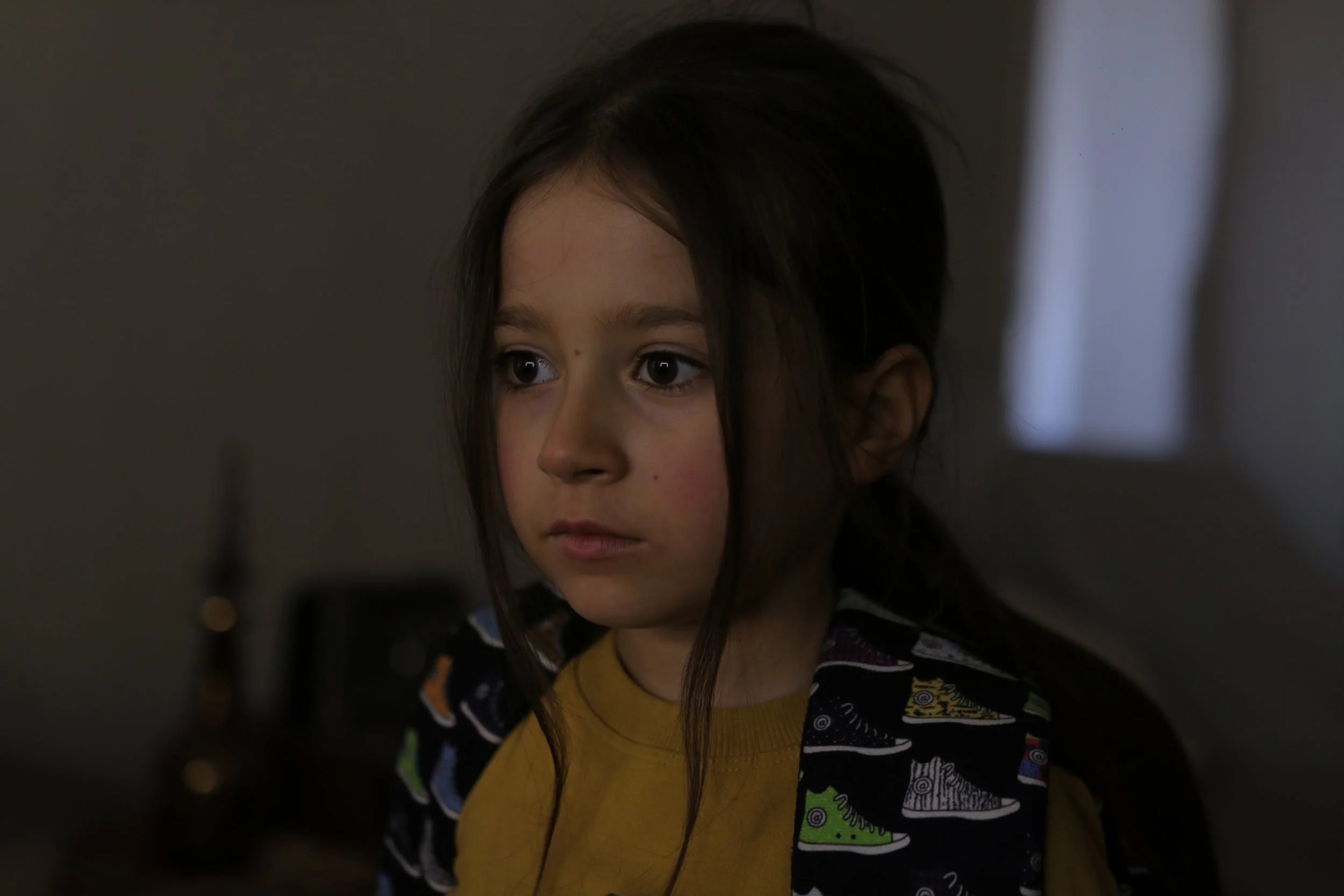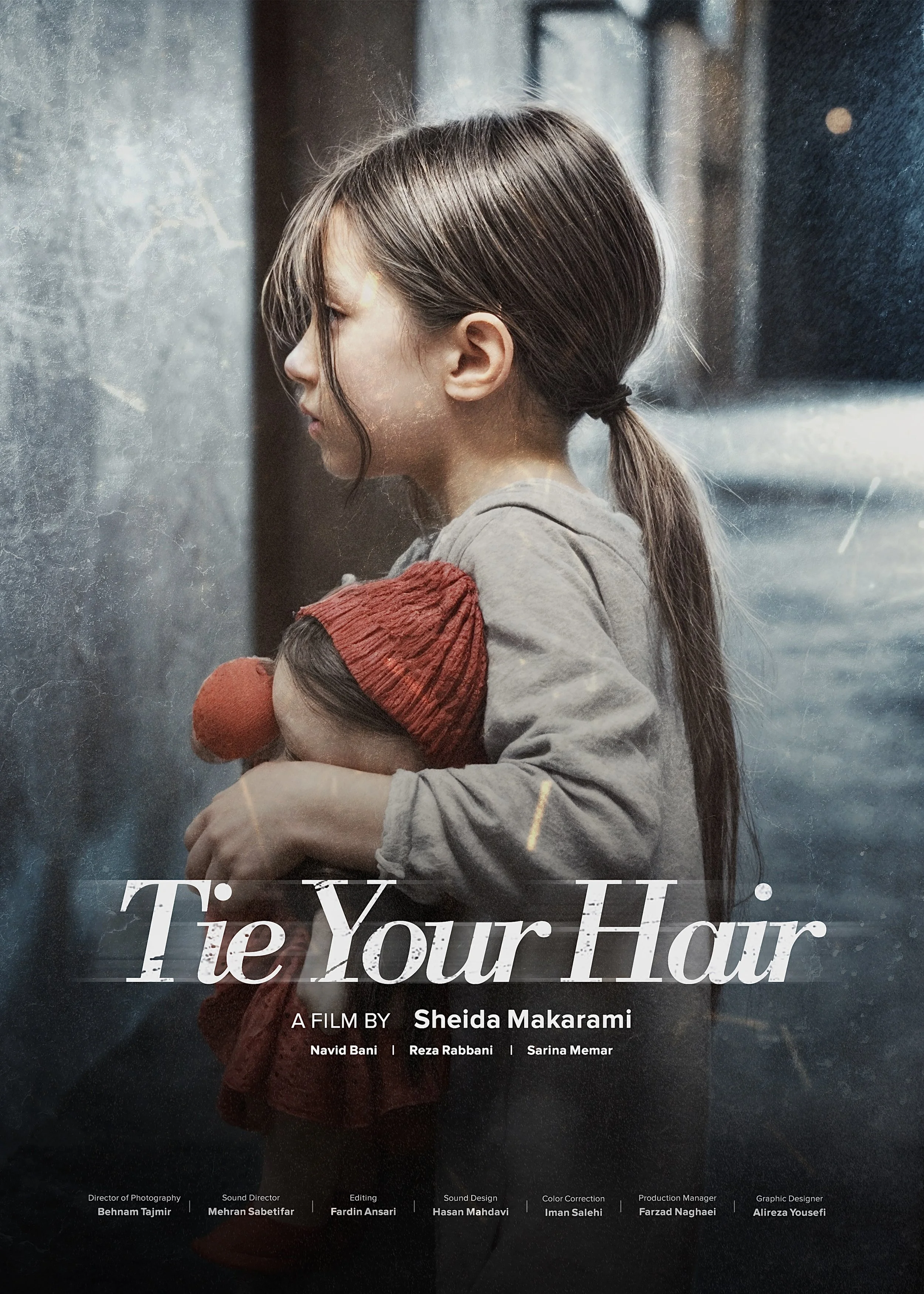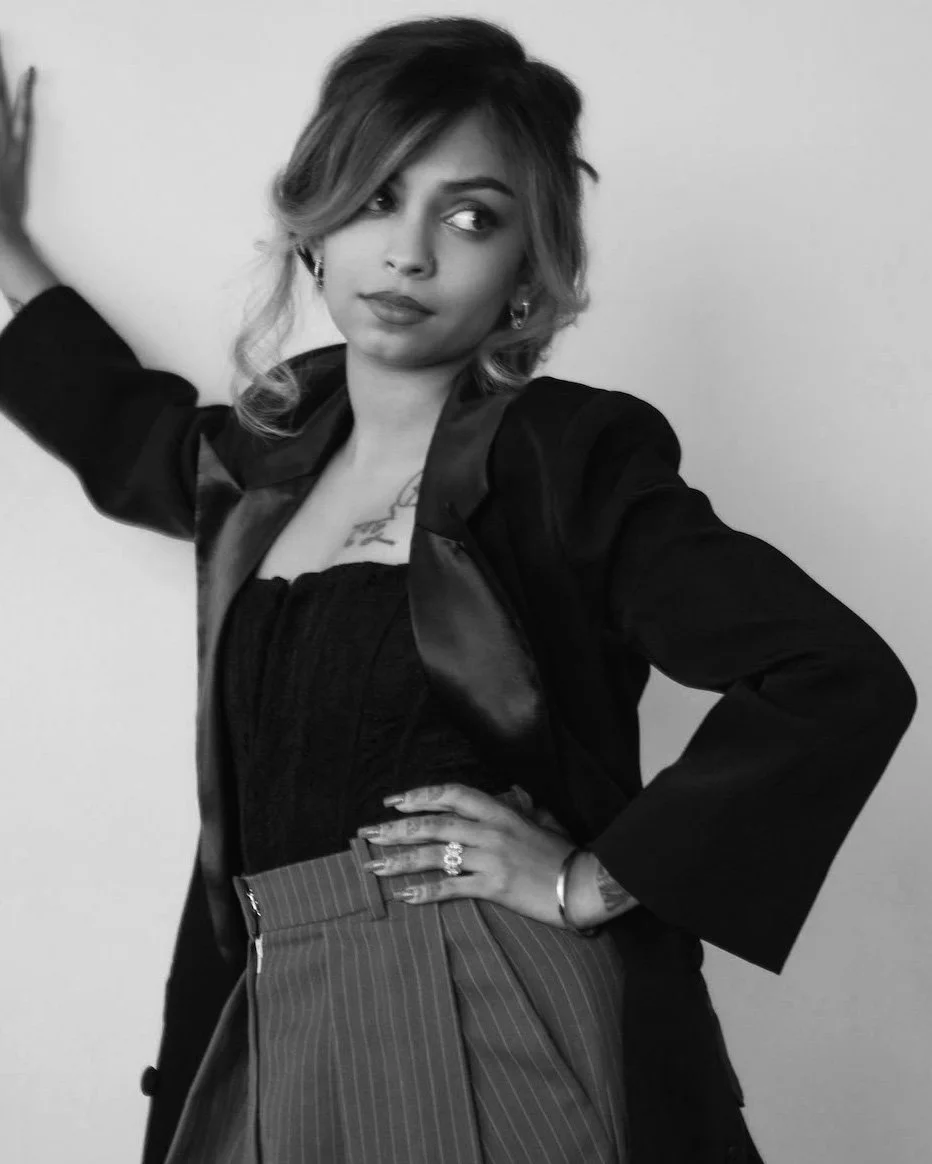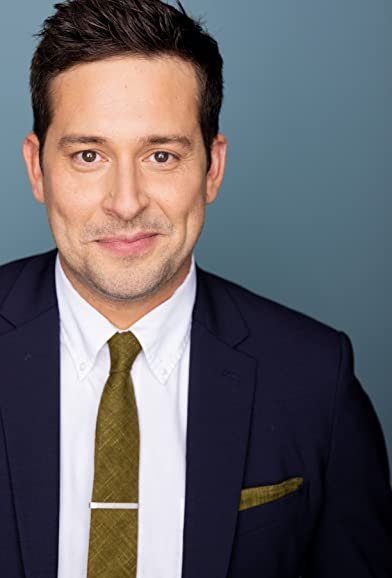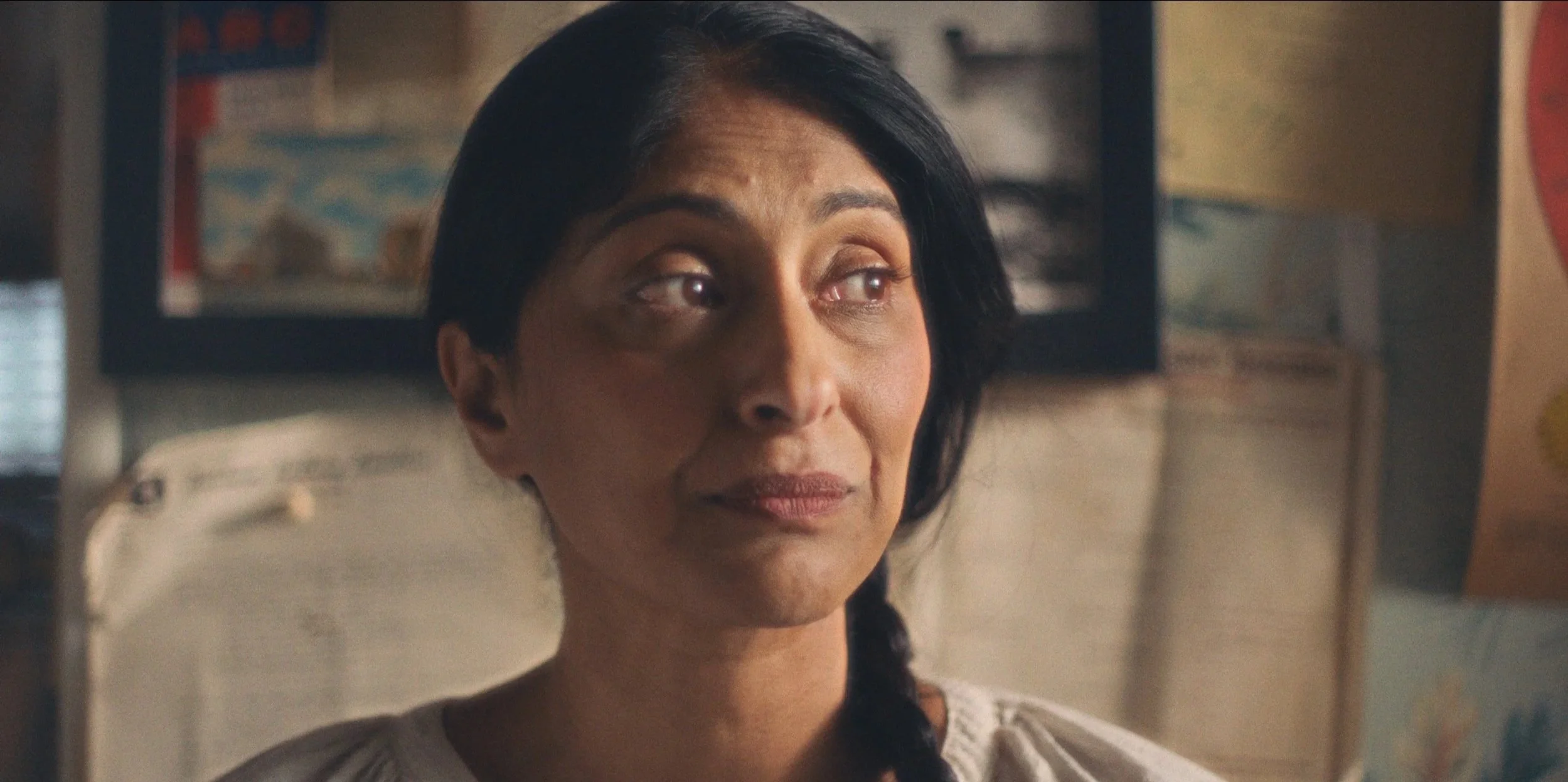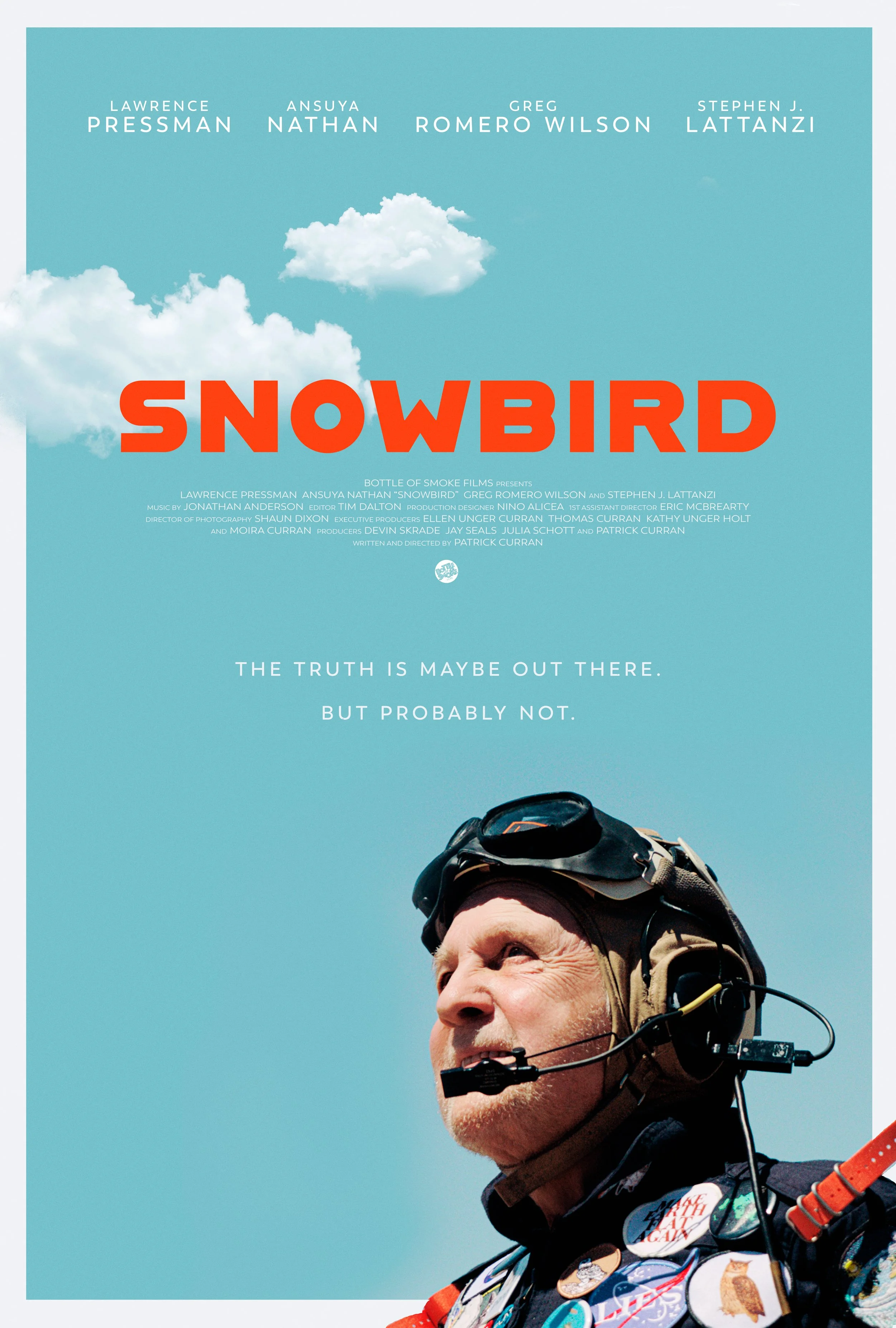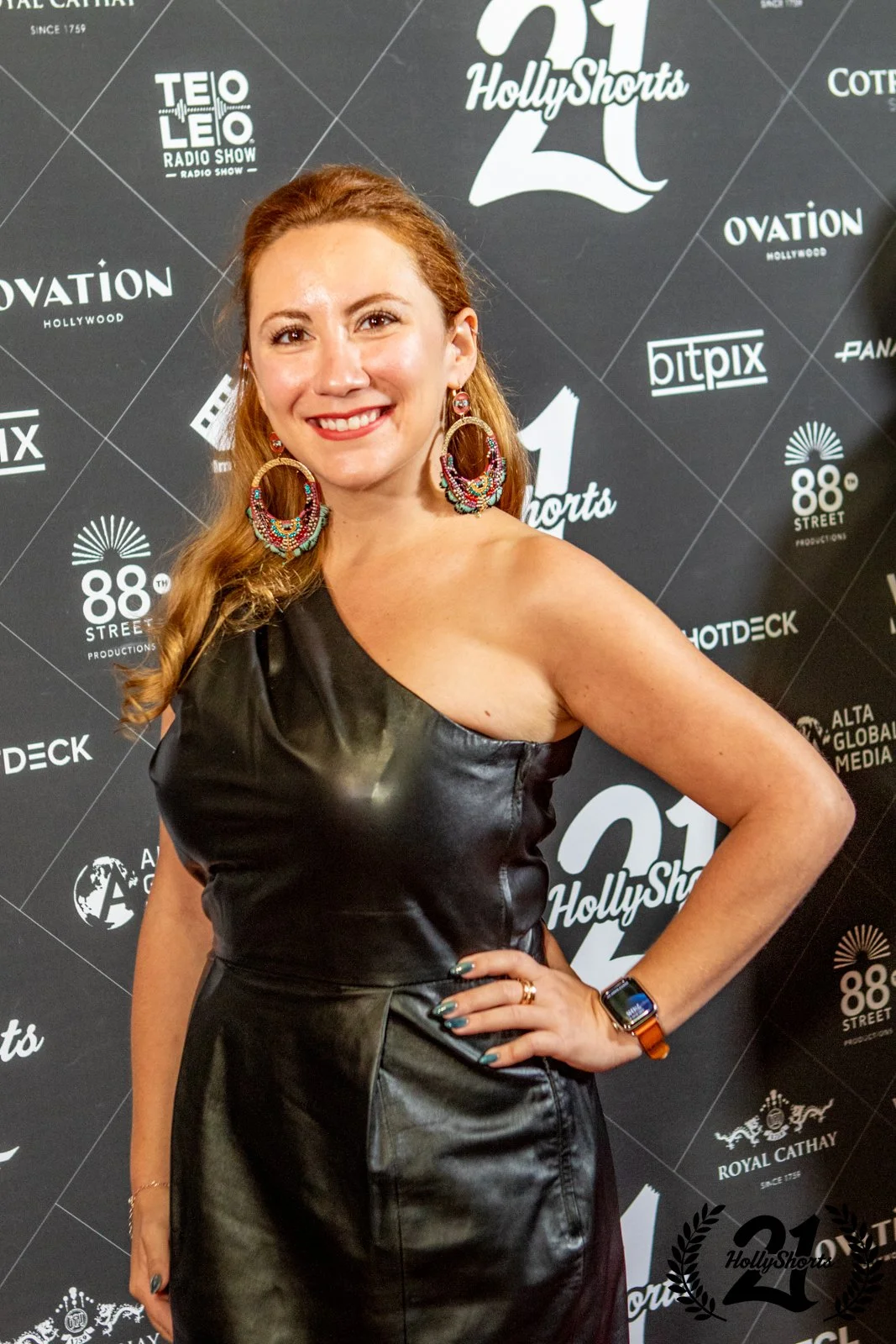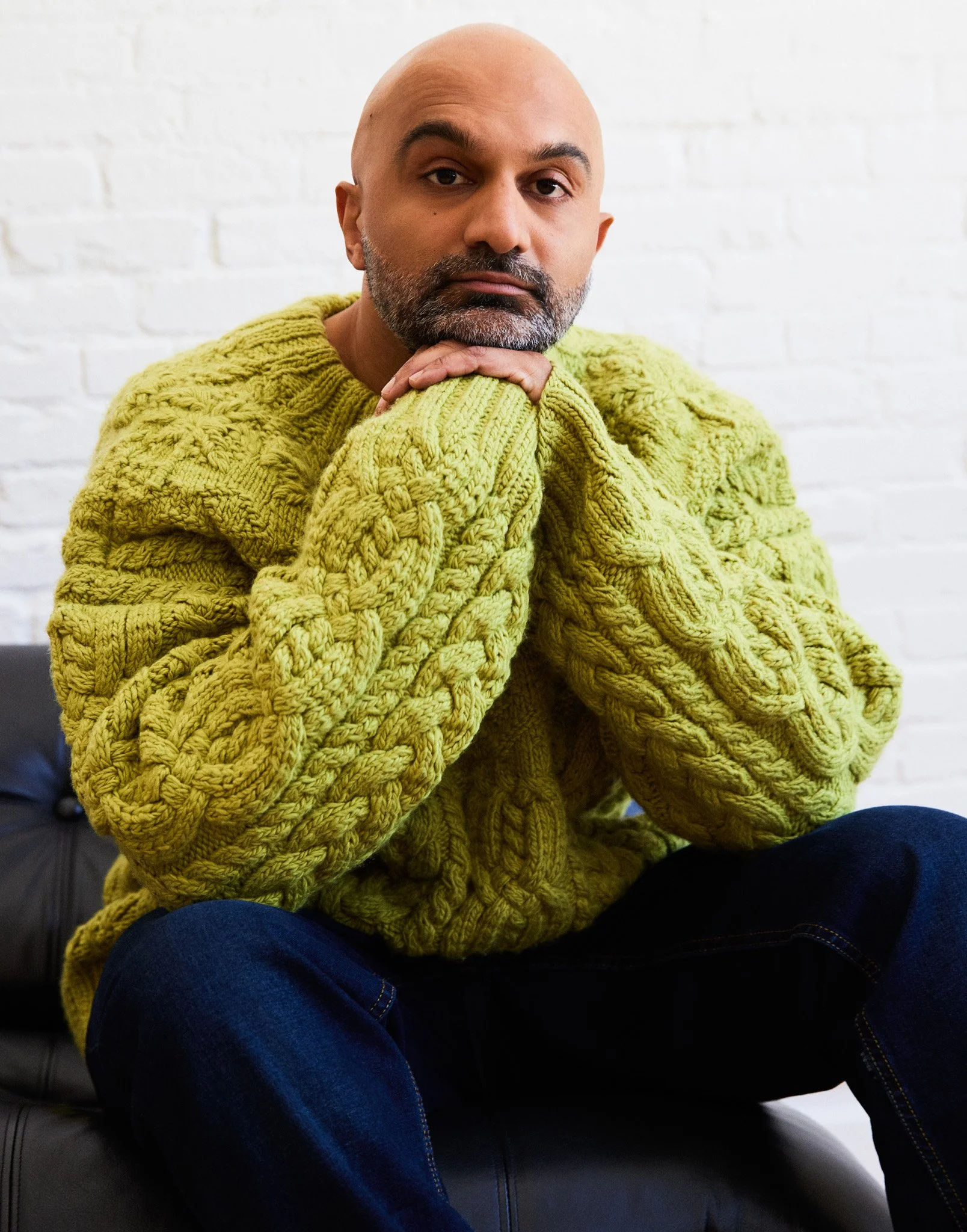Q&A with Filmmaker Sheida Makaremi
Iranian filmmaker Sheida Makaremi debuts Tie Your Hair, blending suspense and emotion after years acting and assisting in film and theater.
Sheida Makaremi
Sheida Makaremi (b. May 8, 1996) is an Iranian filmmaker, screenwriter, and actress with a Master’s degree in Cinema. Her directorial debut, Tie Your Hair, follows a young girl whose mysterious disappearance in an abandoned house reveals hidden truths, showcasing Sheida’s gift for blending suspense and emotional depth. Before directing, she worked extensively in short films and theatre as both an actress and assistant director. Passionate about storytelling across mediums, Makaremi continues to craft cinematic works that explore human connection, memory, and imagination.
This Q&A is part of the Bushwick Film Fest Filmmaker Q&A series
Tie Your Hair (2025)
What inspired you to create this film, and how did the initial idea come to you?
"I wanted to make a film in a very old house, and since issues concerning children have always been important to me, the idea for this film came to my mind and I found it interesting and impactful."
Why does this story need to be told now?
"Given that children are always and everywhere subjected to injustice and may be at risk of exploitation, it is necessary to make films that address children's issues with concern, and for this purpose, we need new and impactful narratives."
Describe who you want this film to reach.
"I want this film to be seen by everyone, especially those who are more involved with children."
What do you hope audiences will take away from watching your film?
"There is also freedom for children, and I want the audience to take a moment to reflect on whether they have ever, even unintentionally, caused harm to a child."
How do you want people to feel after they see your film?
"A sense of empathy with the child and reflection on all the children who are suffering."
What was the biggest inspiration behind this film?
"Children who are forced to work at a young age. In the country where I live, their number is increasing every day."
What was your favorite part of making your film? Memories from the process?
"Working with the child actor was very challenging and at the same time enjoyable. In order to work with them, I had to direct and become friends with them simultaneously."
What was a big challenge you faced while making this film?
"Working with the young girl actor was full of challenges because she was very mischievous and playful."
Tell us an anecdote about casting or working with your actors
"The child actor is my cousin! I chose her because she was incredibly smart."
Can you tell us about the central themes of your film? What message or emotion did you hope to convey?
"Childhood, the exploitation of children, and the loneliness of the child are the themes of the film, and I hoped that by watching the film, we would recognize a healthy childhood as a right for all children."
Were there any films or directors that influenced your approach to this project?
"Yes, the film Shoplifters by Hirokazu Koreeda."
What inspired you to pursue a career in filmmaking?
"The fact that cinema is a medium that people all over the world can watch, and that I can bring all my mental images and stories to life, has always been incredible for me."
Why is filmmaking important to you? Why is it important to the world?
"Art, creation, and being impactful have always been important to me. The world needs new perspectives and fresh stories."
What role does technology play in your filmmaking process, and how has it evolved over the years?
"Certainly, technology has always had a significant impact and has made it easier to bring ideas to life. With a sufficient budget for filmmaking, technology greatly helps in creating a better film. However, my personal preference for making short films is to rely more on creativity."
What is something that all filmmakers should keep in mind in order to become better cinematic storytellers?
"There should always be life flowing in their films, and they should not make films just to please festivals."
Films are lasting artistic legacies; what do you want yours to say?
"A healthy life and a childhood of their own are the rights of children."
If you weren’t a filmmaker, what would you be doing?
"I would have pursued acting and teaching much more seriously."
How do you approach storytelling in your films? What’s your process for developing a script or concept?
"I read a lot of short stories, look at photos and paintings, and while writing, I always listen to a fixed piece of instrumental music. Every day, I think about the idea and put my imagination to work."
What’s your history with the Bushwick Film Festival?
"This is my first experience with the Bushwick Film Festival, as well as my first experience in filmmaking
Can you talk about the festival experience? How does it feel to have your film selected?
"It feels amazing that a film I made in Iran is being shown and discussed on the other side of the world. What could feel better than having an audience who doesn't speak the same language watch the film and yet share a common emotion with me?"
How do you feel about your film being screened in front of a festival audience?
"Certainly, it is exciting, joyful, and inspiring for me. I hope that one day I can watch my future films alongside festival audiences."
What’s the last film you watched?
Belle de Jour (1967)
What’s the last book you read?
Film Theory An Introduction Through the Senses
One thing people don’t know about me is _____.
"I would like to get married!"
Early bird or night owl?
Early bird
What three things do you always have in your refrigerator?
"Milk, tomato paste, and eggs."
This Q&A is part of the Bushwick Film Fest Filmmaker Q&A series
Q&A with Filmmaker Nana Duffuor
Nana Duffuor is a New York-based Ghanaian filmmaker whose award-winning, heartfelt work explores personal and political themes with humor.
Nana Duffuor
Nana Duffuor is a first-generation Ghanaian filmmaker based in New York City. Her work blends heart and humor to explore themes at the intersection of the personal and political. A recent graduate of Columbia University’s Film MFA Program with honors, she has received the Adrienne Shelley Foundation Award for Female Director and the Frameline Completion Fund. Her thesis short, Rainbow Girls, premiered at Frameline International LGBTQ+ Festival, and the feature version is currently in development, continuing her mission to tell impactful, resonant stories.
This Q&A is part of the Bushwick Film Fest Filmmaker Q&A series
Rainbow Girls (2025)
What inspired you to create this film, and how did the initial idea come to you?
At the time, I was living on the West Coast pursuing acting/filmmaking. It was my first time living away from home. One weekend, I visited my brother in Vegas during his work trip and as soon as he left, I opened my notebook and began to write. What came out was all my frustration of living in LA: the lonelineThe film is inspired by true events that took place in the San Francisco Bay Area around 2013. I was living in the Bay Area at the time, when the influx of wealth from the tech industry spurred unprecedented levels of gentrification and displacement of longtime residents. Around that same time, a friend working in retail told me how employees were being trained to deal with these groups of young women swarming high-end stores like Gucci, Prada, and Burberry, then snatching as many items off the shelves as they could get their hands on before bolting. As a lover of heist films like Set it Off, I imagined a story that centers around the friendship between three charismatic young trans women, pushed to society’s margins, who unapologetically push back by looting luxury items associated with the type of wealth, privilege, and prestige that they are too often denied.
Why does this story need to be told now?
I think now more than ever, with this current administration and trans people's rights coming under even further attack, we need stories that humanize our black trans siblings; stories that direct our attention toward systemic inequities; and stories that do all of this, while still centering joy, community, and resistance.
Describe who you want this film to reach.
I want this film to reach any and every body, but especially, I want this film to make my black trans siblings proud
What do you hope audiences will take away from watching your film?
This is a story meant to call obedience into question. Whether audience members find organized retail theft morally justifiable or morally repugnant, they will see themselves in Tati, Angel, and Gemini, and they will root for them. That’s my goal as a storyteller.
How do you want people to feel after they see your film?
I want them to feel like, that was one hell of a ride! We want—no, demand to see the feature-length film!
What was the biggest inspiration behind this film?
My biggest inspirations were the real life young women who took part in these robberies; the gaping social inequity in the Bay Area; and one of my all-time favorite heist films: Set it Off!
What was your favorite part of making your film? Memories from the process?
One of my favorite parts of making the film was when we got to shoot in Union Square in San Francisco. Our actors were running all across the square filming the getaway scenes, and we got one of my favorite shots (of them running through a flock of pigeons) there. And at some point, in between shots, the actresses start voguing and cutting up in the middle of Union Square. It' s like the thesis of the film (taking up space), was brought into reality in that moment. And I hope all the fun and play that we had in making the film shows up on screen.
What was a big challenge you faced while making this film?
This is my most ambitious film yet, in terms of cast and crew size, number of locations, etc.—and the budget reflects that. Luckily, we were filming the Bay Area, where community is such a central part of the ethos. Our producers gave so generously of whatever resources they could to make sure we got this film made, and our crew in the Bay Area was absolutely incredible, and made it work on a student film budget!
Tell us an anecdote about casting or working with your actors.
And as a cisgender queer woman wanting to tell a story with trans characters at the center, close collaboration with the trans folks of color on our production team and in the lead roles for the short has proven invaluable. Our executive producer, Nava Mau, and the three lead actresses—Jai Stephenson, Sis Thee Doll, and Céline Jackson (who also served as script consultants for the short), gave generously of their time and talent to help hone in on the specificity of these incredibly endearing, flawed characters. Through script review sessions and rehearsals, they helped bring Tati, Angel, and Gemini to life in ways I would not have otherwise been able to.
Early bird or night owl?
Early bird...ish.
This Q&A is part of the Bushwick Film Fest Filmmaker Q&A series
Q&A with Filmmaker Harold Jackson
Harold Jackson III is an Emmy-nominated filmmaker, Marine veteran, and acclaimed writer-director passionate about storytelling through powerful visual narratives.
Harold Jackson III
Harold Jackson III is an EMMY Nominated Producer. He grew up in Los Angeles in a large extended family of film consumers. This is where his passion and interest for film was born. Harold soon realized he had a gift for writing. He says, "Storytelling through visualization is what drives me."
After honorably serving our country in the United States Marine Corps, he completed an undergraduate degree in Television at Kutztown University in Pennsylvania. Then went on to complete a master's degree in Film from American University in Washington, DC.
Harold has produced, written, and directed multiple films, series, and documentaries and is a critically acclaimed writer, director, and filmmaker.
This Q&A is part of the Bushwick Film Fest Filmmaker Q&A series
Strangers (2025)
What inspired you to create this film, and how did the initial idea come to you?
I had just come off of a couple of commercial projects. A comedy, then a dark comedy, and wanted to do something grounded and mature. The story of a married couple's fading love was the first that came to mind. The initial idea was about an open marriage, but I realized that it would muddle the heart of the film. So, I grounded it even more and found a way to speak about the topic.
What’s your history with the Bushwick Film Festival?
I am an Alum and throughly enjoyed my previous experience.
Can you talk about the festival experience? How does it feel to have your film selected?
This is one of the first festivals to select the film. It's still hasn't been screened for a proper audience. So I'm super excited. It's always good to see how people receive your work.
What’s the last film you watched?
Love Brooklyn
What’s the last book you read?
Burn This Town
One thing people don’t know about me is _____?
I am a Seinfeld Nerd
Early bird or night owl?
Mid-Dayer
What three things do you always have in your refrigerator?
Sriracha, Blueberries and Eggs.
This Q&A is part of the Bushwick Film Fest Filmmaker Q&A series
Q&A with Filmmaker Anjini Taneja Azhar
Anjini Taneja Azhar, LA-based filmmaker and former Star Trek actor, directs award-winning shorts including 2025 Shore Scripts Grand Jury winner Nanu.
Anjini Taneja Azhar
Anjini Taneja Azhar is a Los Angeles-based producer, screenwriter, and director who began her career as an actor in Star Trek Into Darkness and HBO’s The Brink. While observing J.J. Abrams on set, she discovered her passion for filmmaking. Since then, she has written and directed award-winning shorts and produced for Fortune 500 companies. Her work has been featured in Forbes, Women Cinemakers, and Ladygunn. Festival accolades include selections at Newport Beach, Tasveer, and LAAPFF. Her 2025 short, Who Are You, Nanu?, won Shore Scripts’ Grand Jury Prize.
This Q&A is part of the Bushwick Film Fest Filmmaker Q&A series
Who Are You, Nanu? (2025)
What inspired you to create this film, and how did the initial idea come to you?
‘Who Are You, Nanu?’ is inspired by my grandfather (the titular Nanu). I lived with my grandfather and grandmother ever since I was a child, so I’ve always been quite close to them. They watched me grow up, and in parallel, I watched them grow old. My grandfather, always felt- and still feels- like such a young, kindred spirit deep in his soul. When you watch someone who brimmed with energy and spunk, someone who has always been there, slowly succumb to the turmoils of old age and finally slow down, the reality of how fragile human life is hits you. My mother began having conversations with me a couple years ago about the changes I would begin seeing in my grandfather as he aged throughout my occasional visits home. In a way, this process is like getting to know and learn a whole new person, and this was difficult for me. The grieving process begins early, and for me, it began here. I sat at my desk one night in Los Angeles and recalled my grandfather in the memories in which I cherished him most. I grieved the person he was, in order to reckon with the person he was becoming as he himself navigated what this final era of life looks like. This is how the initial idea for ‘Who Are You, Nanu?’ came to me. I view my grandfather through the eyes of my ten-year-old self. When I look at him, I do not see the delicate ninety one-year-old man in front of me. I see a younger self, before his hair had fully greyed, with rounder cheeks and brighter eyes. I remember the lessons he taught me and the nicknames he called me; the ones he has long forgotten by now. This is how I see him still and how I will always remember him, so I wrote this film through those very eyes of my younger self. I see much of myself in my nine-year-old protagonist, Isha. I always admired my grandfather and his stories of adventure and perseverance, so it only felt right to honour him with a journey of adventure in the film. In that, I wanted the film to feel like a dusty children’s storybook plucked off a shelf. I paired this with the emotional feeling of a soft lullaby sung to me, like the one my grandmother and my mother sang to me as a child that offer the motif of the moon in my film. I’m lucky that my Nanu is still alive and has been able to witness the journey of this film’s making, and now its festival run. It was important to me that he see this process whilst he is still here.
What was your favorite part of making your film? Memories from the process?
There were so many unique memories from filming ‘Who Are You, Nanu?’ from nearly capsizing boats, company moves by river led by the local boatsmen, to experiencing that fiery red sunrise that India is so famous for. Yet, all in all, my favourite part of this process was the crew. To be welcomed into another country and be granted the hard work and dedication from local crew, especially for a short film, is no small thing. My producers Sudhir Sherigar, Vindhya Malik, and their production teams pulled off the impossible and endured perilous temperatures on set with my vision in mind, always. You are as good as your peers, and I was surrounded by the best. My production designers Bindya Chhabria and Arvind Ashok Kumar created a real life moon for me, and atop it, a life-sized home destroyed by an Earthquake. These are no small feats. Through the process, I met lifelong collaborators, like my lead producer and co-star Suchitra Pillai. The beautiful thing about filmmaking is the ‘found family’ you get along the way. With ‘Who Are You, Nanu?’ being a film that every crew member had some personal connection to, I certainly found my new family during this journey. That being said, I do remember how I felt on our morning boat rides on the Ganges traveling to and from location, with the wind hitting my face and the sound of bells, people, and the mantras along the river’s edge that signaled the beginning and end to some of the best days of my life to date.
Can you tell us about the central themes of your film? What message or emotion did you hope to convey?
This film is unconditionally and unabashedly about death and one’s relationship with it. I wanted to let go of this Western idea that to reconnect with one’s deceased has to be a myth or a dream. In my film, my young protagonist, Isha, embarks on a journey with the spectral version of her grandfather’s own nine year-old self, befriending his ghost and forging the relationship with him that she never could whilst he was alive— but it’s never clear to the audience if this journey is a dream or real life. If Isha’s journey feels more like a fantastical experience that very much occurred in her childhood, then so be it. To confine these sort of experiences to dreams, daydreams, or hallucinations is, to me, the acknowledgement that these experiences cannot be true or really occur: but why can’t they? The beauty of growing up in South Asian culture is the inherent, given belief in the spiritual and supernatural, the otherworldly, and not particularly confined to religion (as I’m not religious myself). Ghosts, spirits, the dead as souls wandering about— these are all real to us through our fables and folklore. I wanted this to be explored in my film. I wanted to explore grief through the genre lens of magical realism to create a generational take of my own: what if Isha really did have an experience with the ghost of her grandfather when she was a little girl? The line between reality and the fantastic is blurred with this genre, which felt like the absolute fitting approach to a film that explores grief through the eyes of a child.
Were there any films or directors that influenced your approach to this project?
Of course, one of the greats of South Asian cinema, Satyajit Ray was a large influence on this film. The way he captures the richness of culture and a slight feeling of wonder whilst staying grounded in a hyperrealistic story is to be admired greatly. It was specifically the way in which Ray directs dialogue and banter between characters that I felt so inspired to study for my film. I believe in the power of the portrait. I love faces, close-ups, extreme close-ups, the stories told in every little imperfection of skin. The use of close ups and portrait shots from filmmakers such as Satyajit Ray and Ingmar Bergman were a massive influence. Of course, ‘Who Are You, Nanu?’ is far more vibrant, colourful, even more robust with a sort of whimsy than the works of the former, however it’s the feeling these directorial choices evoke that struck me for my film. When writing the film, I had watched ‘This Is Not A Burial, It’s A Resurrection,’ by Lemohang Jeremiah Mosese— I was captivated immediately. I still believe it’s one of the most tonally and visually beautiful films I’ve seen this past decade, and it largely influenced the way I wrote certain landscapes and imagery. For me, I’ve always been inspired by old cinema and the methods of practical filmmaking. I am not so interested in the innovations of certain technologies that take away from the physical craftsmanship that goes into filmmaking. The building, painting, cranking, decorating: these are invaluable. I brought a lot of these from the older films I love to my film. Our destroyed house on the moon was completely practical, built on a soundstage without any VFX. We shot on 35mm film stock. The purring of a camera loaded with film as it rolls instills a certain discipline and attentiveness on set that I feel at home with. The textures and softness of analog resonate with me deeply as a filmmaker, and I believe I would shoot on film every time if given the opportunity. The only time we really employed VFX was when it was a matter of safety, such as our snake or when Isha is on fire. In this way, the methods in cinema of the past influenced me greatly. I hope to carry this wish me as I grow in this career.
Why is filmmaking important to you? Why is it important to the world?
Filmmaking feels like a part of me. Art, storytelling, film— these are the only ways I can truly comprehend the life around me. Cinema feels, to me, like a soulmate. It is the purest form of humanity. Through filmmaking, we get to be explorers, lovers, darers, and everything in between. The culture around cinema has changed, and going to the theatre is not quite the same unfortunately with cell phones and everything, but it was once such a beautiful thing. To sit in a room with a hundred and some strangers, all connected to the same story yet each taking away something different and personal in a sort of silent togetherness is really one of the most intimate experiences. Rarely can something bring us together in such a fashion than film. I do believe the way I perceive my experiences are in the forms of stories and characters. Film was my way as a child to dream and become something new every weekend. It brought my family and I together, and often during times of turmoil, watching a film together was our refuge. Filmmaking is important to me because it opens our eyes to humanity in all corners of the world, across all spans of time, and it connects us. At the same time filmmakers, like all artists, are disruptors. They must be brave and unafraid of the rules of society. Film is a personal medium: you write or direct what speaks to your heart because if you don’t, you will be unable to make a full night’s sleep, even if it raises controversy. Sometimes, the most personal story can be the most important one, and bring forth change. Filmmaking is important to the world because it must be brave, no matter the story. This bravery is what it means to be human.
Films are lasting artistic legacies; what do you want yours to say?
This is a heavy question, and in a way, I am still discovering the answer. I believe deeply in the lost art of obsession and how this drives artists. I admire what filmmakers used to be: misfits, rockstars, outcasts that only found a home in the world of cinema. It wasn’t something ‘fun’ to try but a necessity of life, just like water and air. I found a home in cinema because this is exactly how I feel. I hope my legacy shows a filmmaker following in these footsteps, driven by a love of the craft and a hunger to only get better— consumed by obsession, reverence, and little bit of madness. I hope I am able to be the type of artist I grew up admiring and create the ‘Hollywood’ I dreamed of around me, even if it’s not exactly the ‘Hollywood’ that is present today. I hope with each film, an audience can watch me becoming braver and more courageous, whilst refining my voice as a filmmaker… discovering who I am. I hope my artistic legacy inspires others not to feel swayed by trends or zeitgeists; art is inherently timeless when it comes from the heart. I hope my artistic legacy shows someone who is curious and taking the form of an explorer through film. The rest in terms of legacy, I suppose, is still of question to me. I believe this answer is probably excavated little by little throughout one’s life, so I hope to find it somewhere along the way.
How do you feel about your film being screened in front of a festival audience?
No matter the festival, screening in front of an audience is absolutely terrifying. My film screened at Bushwick Film Festival in 2023, and I’ve grown so much from then to now, so it’s especially an honour to share this growth with Bushwick. The film is a piece of me, my heart, my family, and perspective on my own experiences. It’s such a personal thing to share, but this is the natural progression of a film’s life after completion. It’s a ‘good’ terrifying, to screen at a festival. More likely than not, a festival audience is coming with a sense of excitement to see your film, so there’s already an overwhelming amount of support. Still, when sharing such a personal story, you hope some little part of it resonates with an audience enough that they feel inclined to take a piece of it home themselves. It’s scary, yes, but such an honour. Bushwick Film Festival has some incredible audiences and takes such good care of their filmmakers. It’s an exciting thing, a terrifying thing, but there’s so much gratitude that I hold all at once. I couldn’t thank Bushwick enough for recognizing my vision with this film and seeing something special in it.
This Q&A is part of the Bushwick Film Fest Filmmaker Q&A series
Q&A with Filmmaker Patrick Curran
Patrick is an LA-based actor, writer, and director crafting intimate, true-story films that inspire social change with humor and heart.
Patrick Curran
Patrick is an actor, writer, director, and producer from Newtown, CT, with over 15 years in independent film. He gravitates toward true stories and intimate, character-driven pieces that inspire social change. Known for using humor to cut through dark, dramatic themes, Patrick focuses on stories about dementia, Alzheimer’s, and making heroes of characters at life’s end. His script Golden and Gone won Best Screenplay at the 2015 Los Angeles Comedy Film Festival, and Fragile won the Industry Insider contest. A 2016 Nicholl Fellowship Semifinalist, he now lives in Los Angeles.
This Q&A is part of the Bushwick Film Fest Filmmaker Q&A series
Snowbird (2025)
What inspired you to create this film, and how did the initial idea come to you?
My beloved grandmother, Dorothy, spent the last 10 years of her life battling Alzheimer's. This is my love letter to her.
How do you want people to feel after they see your film?
I really hope people get inspired to call their parents and say hello after stepping out of the theatre.
Were there any films or directors that influenced your approach to this project?
My DP and I watched a ton of Being There, the late 70s Hal Ashby piece, and Butch Cassidy and the Sundance Kid, when playing with our lenses and deciding what the film's aesthetic would be. We loved what those films did with the old Panavision Super Speeds. And we wanted to replicate that nostalgia energy by capturing that fuzzy glow out in the desert.
Why is filmmaking important to you? Why is it important to the world?
I think more than ever we're in a time that feels really divided. It's in these times that film - and art generally - can bring us together. There's nothing more human than the need to express yourself, and it's my feeling that honest expression will be what gets us out of these polarizing times.
Films are lasting artistic legacies; what do you want yours to say?
We're better together than we are apart.
Can you talk about the festival experience? How does it feel to have your film selected?
The festival experience has been a total whirlwind. I know it's been a competitive year on the festival circuit, and we consider ourselves very lucky to have had as much success with the film as we have with it being a particularly long short. We've been doing so well with small town America, and I REALLY wanted to land a great NYC fest and showcase this with some young, hip, edgey filmmakers. Was gassed up when my favorite, Bushwick, came calling.
What three things do you always have in your refrigerator?
Almond milk, picked jalapeños, some of my girlfriend's skin care routine
This Q&A is part of the Bushwick Film Fest Filmmaker Q&A series
Q&A with Filmmaker Serena Dykman
Serena Dykman is a NY-based “culture-clasher” filmmaker whose award-winning work—including Nana and Babka—explores humor, heart, and human connection worldwide.
Serena Dykman
Serena Dykman is a New York–based filmmaker and self-described “culture-clasher” who connects people through humor, heart, and humanity. A third-culture kid born in Paris and raised across Brussels, the French Antilles, London, and New York, she graduated from NYU’s Tisch School of the Arts. Serena’s work spans comedy, drama, and documentary, earning over 25 awards, including a Webby and a Humanitas Prize nomination. At 23, she directed her debut feature documentary Nana. She recently completed Babka, At See, and M.U.B. and continues developing projects worldwide..
This Q&A is part of the Bushwick Film Fest Filmmaker Q&A series
At See (2025)
What inspired you to create this film, and how did the initial idea come to you?
I was doing research on guide dogs and low vision & blind individuals for a fiction film I wrote and directed title BABKA. BABKA follows a hasidic baker who loses his sight and needs a guide dog in a dog averse community. Through my research, I connected with Frank Senior, a phenomenal jazz singer, blind since birth, who has had 7 guide dogs. Frank and I quickly became friends. One day, he told me that he was going on a commercial cruise with a group of blind folks and their guide dogs. I said "Frank, that sounds like a movie".
Why does this story need to be told now
In a time where conversations about accessibility often feel abstract, this story shows—in a joyful, human way—what inclusion actually looks like. It’s both a reminder and a call to action to make our world more welcoming.
What do you hope audiences will take away from watching your film?
MI hope they see blindness not as limitation but as another way of experiencing the world—and that accessibility benefits everyone. Most of all, I want them to walk away inspired by the travelers’ independence, courage, and joy.
What role does technology play in your filmmaking process, and how has it evolved over the years
Technology makes my work more accessible—from captions and audio description to the way I edit and share films. Over the years, I’ve become more intentional about using these tools not just for compliance but to expand who can experience the story.
What’s your history with the Bushwick Film Festival?
My feature documentary NANA screened at BFF in 2018!
This Q&A is part of the Bushwick Film Fest Filmmaker Q&A series
Q&A with Filmmaker Thomas Bentey
Tom Bentey is a Jersey-born filmmaker, actor, and educator, founder of Suburbanite Productions, with credits in film, TV, and theater.
Thomas Bentey
Tom Bentey, a proud Jersey native from Edison, NJ, spent his summers at the Shore before studying English at Rutgers, where acting in student films and plays set his career path. He later founded Suburbanite Productions, LLC, producing feature films, documentaries, and television, beginning with At the Jersey Shore. As an actor, he is a SAG-AFTRA member with credits in The Marvelous Mrs. Maisel, The Equalizer, and FBI. Tom also teaches at Raritan Valley Community College and Montclair State University.
This Q&A is part of the Bushwick Film Fest Filmmaker Q&A series
The Cafone (2025)
How do you feel about your film being screened in front of a festival audience?
I love getting real time feedback from a live audience. It can be heartwrenching, but it's fulfilling to see how your film resonates with different audiences.
What’s the last film you watched?
"Nashville" Robert Altman 1976
What’s the last book you read?
"Beautiful World, Where Are You" Sally Rooney
One thing people don’t know about me is _____.
Summer is my favorieate season
Early bird or night owl?
Early Bird 100%
This Q&A is part of the Bushwick Film Fest Filmmaker Q&A series
Q&A with Filmmaker Samantha Herrera
Samantha is a NYC-born filmmaker and actor; her award-winning work includes Tales of a Shadowboxer and Saint Vegas, showcasing dynamic storytelling.
Samantha Herrera
Born and raised in New York City, Samantha studied drama at LaGuardia High School of Music & Art and Performing Arts. Her directorial debut, Tales of a Shadowboxer, co-created with Sharif McFadden, won Best TV Pilot and Best Women Short at the Independent Shorts Award in Los Angeles. Her short film Saint Vegas premiered at the 2025 Los Angeles Asian Pacific Film Festival and was a quarter-finalist for The Chimaera’s To.Get.Her Finishing Fund. Beyond acting and directing, Samantha works at The Neighborhood Playhouse, teaches yoga, and co-runs a Filipino food pop-up.
This Q&A is part of the Bushwick Film Fest Filmmaker
Saint Vegas (2025)
What inspired you to create this film, and how did the initial idea come to you?
At the time, I was living on the West Coast pursuing acting/filmmaking. It was my first time living away from home. One weekend, I visited my brother in Vegas during his work trip and as soon as he left, I opened my notebook and began to write. What came out was all my frustration of living in LA: the loneliness, yearning to find my creative spirit, being homesick and my struggle with my sexuality & depression
What do you hope audiences will take away from watching your film?
Saint Vegas is subtle in a way that long term depression felt for me. Thankfully, there was light at the end of the tunnel in my mental health struggle. When I came out to my family, it was only then I finally felt a heavy weight lifted. Whatever negative feeling that lives inside you that may feel permanent, I hope people can come away feeling inspired and hopeful despite their emotional struggles. I also wanted to portray my voice as a Filipina American that felt honest and vulnerable. This was the first time I’ve created something that feels closest to who I am.
What was a big challenge you faced while making this film?
Sound. We lost an entire day of audio and had to reconstruct everything in the studio and some in the actual shooting location. Overall, it was a journey of getting the film's sound to match with the emotional journey of the character. Thanks to my incredible team: Deeba Montazeri, Andrea Roccasalvo, Brian Nichols, and Nate Attias --- they were instrumental in elevating this film. Especially our composer, Deeba, she channeled Saint Vegas' story through music in a way I never imagined and will always cherish.
How do you approach storytelling in your films? What’s your process for developing a script or concept?
Music was instrumental in helping establish tone and simply getting the words out on the page effortlessly. It made the process enjoyable and natural. Saint Vegas started out as a feature script which I wrote in various places: in my car, on the beach, hours on the couch during co-vid. Condensing the feature to a short was the most difficult process of writing. Finding the happy medium of staying true to the story and working with a limited budget was a challenge. Having the script read out loud at one of INTAR Theatre’s Open Space Salons in NYC was helpful in figuring out what the audience responded to and what was confusing. Working alongside Ellin Aldana, our cinematographer, was an absolute gift. Her strong storytelling stills and deep passion in crafting imagery transformed Saint Vegas. She is a mastermind genius during pre-production as we were putting together our shot-list that has shifted and leveled up my perception of what it means to prep and to tell a story visually.
What’s the last film you watched?
Copycat (1995)
What’s the last book you read?
How to Stand Up to a Dictator by Maria Ressa
What three things do you always have in your refrigerator?
Sawsawan (Filipino Spiced Vinegar), beer (for those rainy days), eggs
This Q&A is part of the Bushwick Film Fest Filmmaker Q&A series
Q&A with Filmmaker Usman Ally
Usman Ally is a filmmaker and actor; his award-winning short Emigre/Americana and acclaimed script Mimi and Saad garnered critical praise.
Usman Ally
Usman Ally’s short film Emigre/Americana was Jury Nominated for Best Short Film Over 15 Minutes at the Palm Springs International ShortFest and won the Audience Choice Award at DC Shorts. As a writer, his feature script Mimi and Saad: An American Love Story scored highly on the Black List, earning critical praise. As an actor, Usman is known for his work on Veep and Suits, and he has been a New York and Chicago stage veteran for over 15 years, winning numerous awards.
This Q&A is part of the Bushwick Film Fest Filmmaker
Emigré/Americana (2025)
What inspired you to create this film, and how did the initial idea come to you?
The inspiration for Émigré/Americana comes from a personal experience I had about ten years ago. I was riding the subway when a woman began verbally attacking me — calling me names and threatening to have me deported. What struck me most wasn’t only her words, but the silence of the people around me. I felt completely isolated, trapped in that train car, and dehumanized in a way that stayed with me for years. I began to wonder: what if someone had stepped in? That thought opened up a much larger set of questions for me — about the dynamics of white saviorism and the saved, about privilege and vulnerability, and how those roles are portrayed in Hollywood vs how they might play out in real life. In the film, both characters essentially need each other: one to be seen as the savior, and the other to be seen as worth saving. That tension complicates their relationship and reflects a deeper truth about power, perception, and privilege, Émigré/Americana is rooted in those questions. It’s about resilience, but also about the messy, complicated space where human connection and systemic inequities collide. I wanted to create something that forces audiences to consider not only the cruelty of racism, but also the complicity in silence.
What do you hope audiences will take away from watching your film?
Well, for starters I hope people feel invested in these characters and want to see the feature film version! This short film is the prelude to the feature where we follow all of these characters over a 5 year period, as they navigate their relationship in an increasingly hostile and divided America.
What was a big challenge you faced while making this film?
Budget! Shooting anything in LA is grossly overpriced and expensive. It's a really big point of contention for independent filmmakers in California.
Tell us an anecdote about casting or working with your actors.
Mouzam Makkar has a great moment playing Pooja where she goes into a monologue about her life story. A couple of times in rehearsal she would perform it while crying, and it was moving and beautiful, but it wasn't right. I wanted Pooja to be a powerhouse, who opens up in a way that she ordinarily would not, and I find the act of fighting tears far more affecting than actually crying. So, we talked it over and really worked on holding off until she can't anymore, and then just hating the fact that a tear comes out, and wiping it away. I cannot wait for you to see that moment. It's beautiful and powerful.
Were there any films or directors that influenced your approach to this project?
A lot of Spike Lee, particularly the music and how it pushes us through a story. I also listened to a lot of Mira Nair talking about shooting on a small budget.
What inspired you to pursue a career in filmmaking?
Ive been an actor for over 18 years now. I've spent a lot of time on stage, and on screen, but I've always loved crafting an entire story. Directing has come naturally to me, and I've always enjoyed writing. I think real change comes from more representation behind the camera. This is what I'm hoping to do!
What’s the last film you watched?
Longlegs!
What’s the last book you read?
King Leopold's Ghost by Adam Hochschild!
This Q&A is part of the Bushwick Film Fest Filmmaker Q&A series
Q&A with Filmmakers Kristina Libby & Tim Cahill
Micah Khan is a filmmaker behind 30+ shorts, acclaimed Meetcute on Danceworld, and feature The Zombie Wedding.
Tim Cahill
Micah Khan has directed and produced over 30 short films and recently wrapped the indie TV pilot BOOKS, starring Spencer Grammer (Rick and Morty, Greek) and Ajay Naidu (Office Space), as well as the vampire thriller short STAKEOUT, starring Seth Gilliam (The Walking Dead, The Wire) and Sonja O’Hara. His acclaimed short Meetcute on Danceworld was featured in MovieMaker Magazine, tweeted by Ben Stiller, and praised by Game of Thrones’ David Benioff. Micah also directed The Zombie Wedding, the first feature from Weekly World News Studios, with a 21-person ensemble cast.
This Q&A is part of the Bushwick Film Fest Filmmaker Q&A series
Books (2025)
What inspired you to create this film, and how did the initial idea come to you?
We love Books. And, TV. And, we had no idea why they had to be so separate. So, we thought, what if we make a nice cozy show in a bookstore? Then, we went to McNally Jackson and had a really hilarious experience with a clerk about a John Grisham novel. After that we were convinced we were on to something.
Why does this story need to be told now?
Book reading is having a moment. With events like Reading Rhythms and book-themed date nights selling out, readers are finding each other and coalescing. But, if you watched tv you'd never know. This is a reflection of the times.
Describe who you want this film to reach
Anyone who has ever loved Alice, Peter Pan, Lyra, or another literary figure and those who find themselves drawn to books and bookstores like bees to honey.
What do you hope audiences will take away from watching your film?
A good laugh and a warm sense of what could be possible if we allowed ourselves to inhabit a bookstore for a while.
What was the biggest inspiration behind this film?
Cheers. Friends. Classic 90s sitcoms that were big-hearted, funny and ultimately shows you wanted to live inside.
Tell us an anecdote about casting or working with your actors.
Our director, Micah Khan, has done a wonderful series on his Instagram with all these stories. Check it out!
Can you talk about the festival experience? How does it feel to have your film selected?
Thrilled! We are excited to share the project with our community here in NYC!
Early bird or night owl?
Early birds.
This Q&A is part of the Bushwick Film Fest Filmmaker Q&A series
